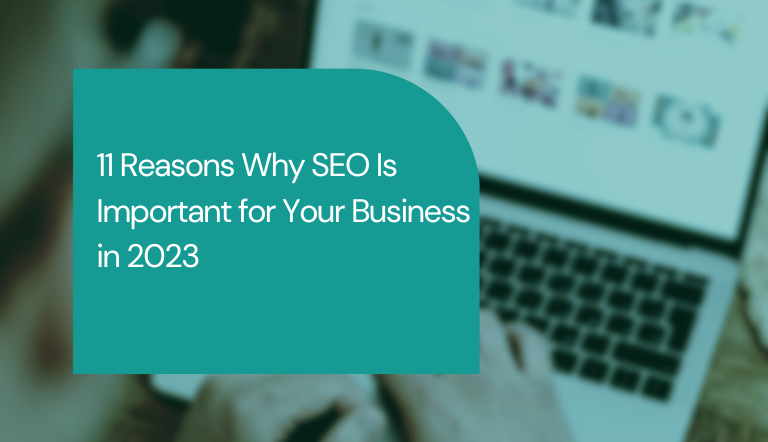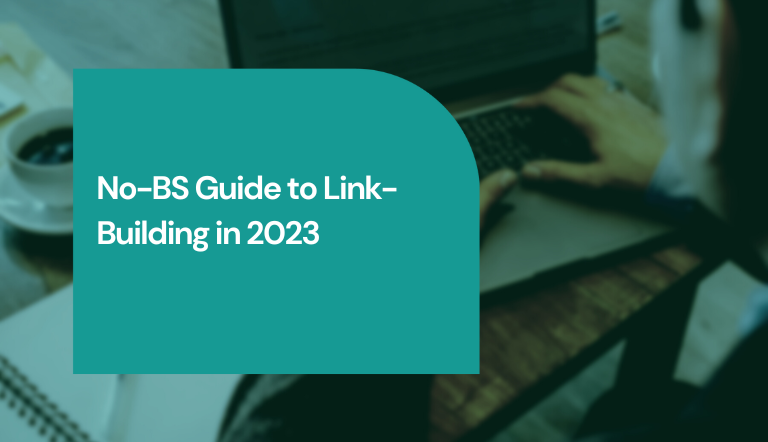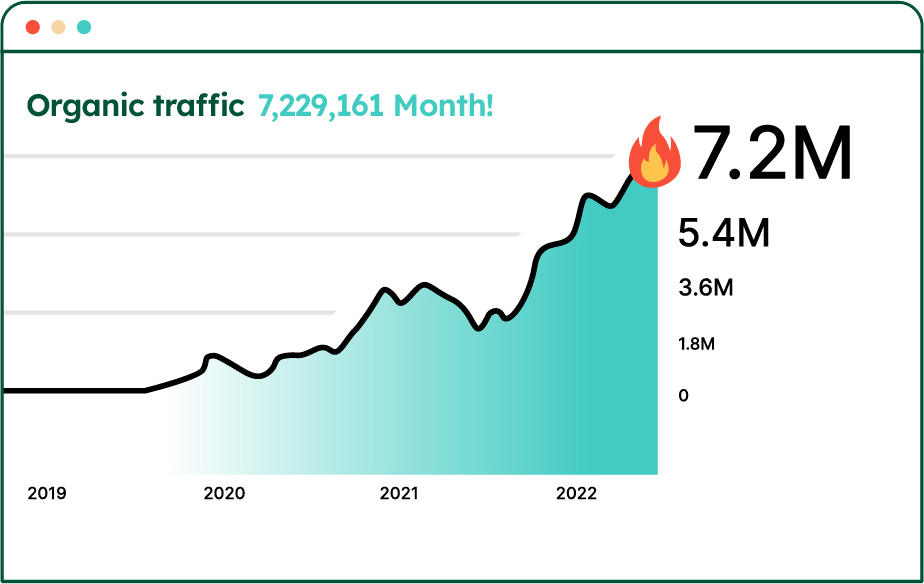Search Engine Optimization (SEO) has been a vital part of business growth strategy for many years and 2023 is not going to be any different. In fact, SEO may be more important than ever.
So, why is that?
For starters, SEO helps you get more visibility on search engines, attract potential customers, improve user experience, and so much more.
Without proper SEO, you risk getting left behind by your competitors and being buried deep on the search result pages.
To prevent this from happening, we have created this article explaining everything you need to know about the importance of SEO in 2023. From the SEO basics to the reasons why SEO matters, we cover everything SEO-related that’s relevant this year.
Let’s dive in!
What Is SEO?
SEO represents a set of practices (i.e. keyword research, on-page optimization, link building, mobile optimization) designed to boost your positioning and visibility in search engine results pages (SERPs).
Considering that most people use search engines to look for new products and services, improving your search engine rankings and attracting more organic traffic to your website can be extremely beneficial to your business.
For example, an effective SEO strategy can boost the overall experience of people visiting your website and get your brand in front of even more audiences. In turn, you’re more likely to convert these new website visitors into loyal customers.
11 Reasons SEO Is Important
Have you ever wondered why some websites struggle to rank on Google’s top results even though they seem to create quality content? The secret lies in SEO – a process that can boost online visibility and support business growth.
Read on to discover the importance of SEO and how investing in it can help your business succeed in today’s competitive digital world:
#1. SEO Builds Trust
Websites that rank high on SERPs are considered high-quality and trustworthy.
Think of it this way – when you’re looking for a product or service, do you have more trust in a business that appears at the top of search results or the one buried on page three? Chances are, you won’t even go past the first page of Google.
After all, there must be a good reason why Google decides to display those results first, right? And if your website is credible enough to be on the first page of search results, it definitely means potential customers are going to trust you more.
However, establishing authority with search engines doesn’t happen overnight – you need SEO for that.
This means, you need to post content regularly, include the right keywords, optimize on-page elements, acquire backlinks, and provide real value to your customers.
This takes time and patience, but if you’re serious about building credibility, you should start by checking out Google’s E-A-T guidelines that explain what you need to do to improve your authority on Google.
#2. SEO Complements Your Content Marketing
Content marketing is an online marketing strategy that uses SEO writing to create valuable, relevant, and engaging content to attract and retain a target audience. That includes creating and sharing blog posts, articles, videos, podcasts, and other media.
Creating original and valuable content will engage your audience more effectively and send a signal to search engines that you’re worth popping up on Google’s first page. In addition, creating SEO-optimized content can help search engines realize its relevance and judge it more favorably.
So, SEO and content marketing go hand in hand, which means you can achieve the best results if you combine these two strategies.
#3. SEO Improves Your Website’s Visibility
When you’re talking about the importance of SEO, one of the first benefits that come to mind is how it increases your website’s visibility. By optimizing your content for specific keywords and phrases relevant to your niche, you can attract people who actively search for products and services like yours.
If you think about how most people click on a result from the first page of Google, you simply cannot afford not to be there, especially considering that your competitors are probably investing heavily in SEO too.
A good SEO strategy can help you stand out from the competition, making your website more visible in search results. To do that, you need to ensure your website loads fast, your content is valuable and engaging, and that everything is optimized to please search engine algorithms.
In addition, you should ensure your website is mobile-friendly, considering that internet users today mostly use smartphones. Actually, mobile users account for 60% of all internet traffic and the number has been steadily increasing for the past 10 years.
#4. SEO Drives Organic Traffic to Your Website
Organic traffic refers to visitors that come to your website without being influenced by any paid advertising. SEO is a vital factor that determines how much organic traffic your website is going to receive.
When someone types into a search box, they’re essentially asking a question. Search engines use complex algorithms to determine which websites provide the most valuable and relevant answers to that question.
So, optimizing your website for search engines increases your chances of ranking at the top of search results. This is important because 53.3% of all web traffic comes from organic search, according to BrightEdge.
As such, setting up a good SEO strategy can significantly increase your visibility on search engines and drive organic traffic your way.
#5. SEO Improves User Experience
SEO is not just about making search engines fall in love with your website – it also plays an important role in improving user experience and getting readers to love it, too.
In fact, Google is increasingly placing a bigger emphasis on user experience when determining how to rank websites. So, by enhancing your SEO, you can boost user experience, which will additionally improve your standings with search engines.
One of the best ways to improve user experience is to structure your content in a logical way that makes it easier for readers to find the information they’re looking for.
To do that, use subheadings, bullet lists, images, and other elements to make your content scannable and more aesthetically pleasing. In addition, you should avoid using overly-complicated language, as it can overwhelm your readers.
Following these practices can improve your content readability, increase engagement, provide a more positive experience, and help turn your website’s visitors into customers.
#6. SEO Is Cost-Effective
SEO is cheap and cost-effective compared to other marketing strategies like pay-per-click (PPC) advertising, even if you decide to outsource your SEO to experts for better results.
While it is true that you need to keep creating new content and optimizing it for search engines to stay ahead of the competition, once search engines realize your website is credible and authoritative, it will become easier to maintain and improve your SEO progress.
That’s why SEO is one of the most cost-effective marketing approaches out there.
For example, business-to-business (B2B) companies report generating twice as much revenue from organic traffic compared to other channels, according to BrightEdge research.
Other approaches like PPC advertising, on the other hand, can bring excellent results for businesses, but a big disadvantage is that the benefits stop as soon as you halt your campaign.
#7. SEO Helps You Rank Better in Local Searches
Not all businesses need global attention.
For example, a chiropractic clinic in New York City doesn’t benefit much from appearing at the top of search results for people looking for a chiropractor in Los Angeles. However, they definitely want to be first on Google search results when people type in “best chiropractors in NY” or “chiropractors near me.”
And that’s where local SEO comes into play.
Local SEO helps you rank better in local searches by optimizing your website to target specific geographic locations. That way, when people look for products or services in your area, your website can appear at the top of search results. This practice is vital for businesses that rely on local customers.
Local SEO includes creating content with location-specific keywords in mind. It also includes building your online presence on platforms like Google My Business, Yelp, Facebook, and other directories and review websites.
#8. SEO Gets You Quantifiable Results
Although it’s easier to calculate your Return on Investment (ROI) with paid marketing strategies, tracking SEO results is relatively easy.
Setting up website analytics helps you track your rankings, traffic, conversions, and other important parameters. Google Analytics is the most popular way to do that, but there are other tools you can use to get the information you need.
Analyzing this data helps you determine various aspects of your customer’s buying behavior. You can see the keywords they used to search, the pages they engaged with, and their actions. This information can help you gain valuable insights into the effectiveness of your SEO strategy and allow you to improve your SEO efforts.
#9. SEO Is a Long-Term Strategy
Some business owners don’t do SEO because it takes some time to see the results. For example, most experts agree that it takes three to six months to notice the impact of a SEO campaign. That doesn’t sit well in today’s fast-paced market, where businesses want results right away.
However, one of the main advantages of SEO is that it is an excellent long-term strategy.
Once you optimize your content and website for search engines, you only need to tweak them occasionally to keep everything SEO-optimized.
Building a good SEO foundation means you won’t be as affected by search engine algorithm updates and that you only need to put in a little effort to maintain your SEO, by producing fresh content, keeping your site fast and functional, and continuing your link-building efforts.
Unlike other forms of online marketing, such as PPC advertising, SEO continues to produce results even after your initial investment. This long-term nature of SEO allows you to build a steady stream of organic traffic that leads to more consistent revenue and business growth.
#10. SEO Impacts Customers’ Buying Cycle
Buying cycle refers to the journey your customer goes through before making a purchase. This involves a series of stages that help them gain awareness of the product or service, consider different solutions, make a buying decision, and evaluate the purchase.
Today, most people research a product or service online before making a purchase. Having an effective SEO strategy impacts their buying cycle, as it helps customers become aware of what you have to offer and explain the benefits of your product or service.
SEO brings more people to your website, where you can provide all the info they need to choose your business.
#11. SEO Is Here to Stay
As the online world continues to grow and evolve, SEO remains one of the best ways to gain a competitive advantage and reach your consumers. After all, one thing is certain – people will continue looking for products and services online. And SEO helps businesses attract these consumers.
In addition, the increasing use of mobile and voice search has made SEO more important than ever. Businesses need to optimize their websites and online presence to keep up with these technologies and new SEO trends.
The practice of SEO began in the mid-1990s, and it’s clear that SEO will exist in the foreseeable future.
SEO Basics
SEO involves a variety of techniques and strategies that optimize your website to rank higher in search engine results. The common tactics include on-site optimization, off-site optimization, and local SEO.
In this section, we’ll explore the basics of SEO and show you how to get started on the path to success.
#1. On-Site SEO
On-site or on-page SEO includes practices and strategies you can use to make sure your website is optimized for search engines. This involves everything from content creation to improving the technical aspects of your website.
By working on your on-site SEO, you can boost your website’s visibility on search engines and provide a better user experience for your visitors. So, how do you do that?
The key strategies for on-site optimization are:
- Keyword research and selection
- Creating optimized, engaging, and valuable content
- Optimizing titles and meta descriptions
- Adding internal and external links
- Adding image alt attributes
Keep in mind that this is not a comprehensive list of on-site SEO tactics. It’s just some areas you can improve for better SEO.
Choosing the right keywords is crucial for the success of your SEO campaign. Keywords are phrases your potential customers search for online. You need to find these keywords using tools like Google Keyword Planner, Ahrefs, or SEMrush, and include them in your content.
Use keywords in the headings, subheadings, and throughout your content to help search engines understand what your content is about.
But, search engines want more than keywords – they want to see content that’s engaging and valuable to humans. That’s why Google rewards people-first content and displays it at the top of search results.
And that’s not all there is to on-site SEO.
You also need to optimize titles, meta descriptions, image alt attributes, and other elements. Doing this helps search engines better understand your content and rank it more favorably.
Lastly, adding internal and external links improve SEO and user experience. Internal links help visitors discover more of your relevant content and keep them engaged. On the other hand, external links give you the ability to include more facts and data to back up your claims, which can establish you as an authority in your niche and improve your credibility.
#2. Off-Site SEO
Off-site SEO refers to strategies used outside of your website to improve your website’s search engine ranking and visibility. That includes link building, social media presence, guest posting, and more.
Acquiring backlinks is the most important part of off-site SEO. That’s because when quality websites link to your content, search engines see it as a sign of trust, so they increase your website’s ranking. In fact, Google states that backlinks are one of the three most important search ranking factors.
Unfortunately, acquiring backlinks is often difficult, and more than half of digital marketers report that link-building is the most challenging part of SEO.
In addition to link building, you can use social media networks, forums, and other directories to improve your brand’s online presence and visibility. These tactics can boost your credibility and authoritativeness, which impacts how your content ranks on search engines.
Check out this comprehensive list of the most important link-building statistics and trends to conquer this part of off-site SEO and boost your search engine rankings.
#3. Local SEO
Local SEO refers to the practices of optimizing your content and website to rank better on search engines in location-based queries. This means that when someone searches for a product or service in your area, your business appears at the top of search results.
Here’s why local SEO is so important:
46% of all Google searches seek to find information about local businesses. Considering there are 8.5 billion Google searches every day, it quickly becomes clear how much business you’re losing by neglecting your local SEO.
So, how do you improve your local SEO?
The most important thing is to create location-specific content that mentions your city or service area. In addition, you need to create a Google My Business profile, which is a useful tool that helps you manage your online presence across different Google platforms, including Google Maps.
Lastly, you want to generate online customer reviews, get listed in local directories, and create profiles on other platforms that promote local goods and services. By focusing on these strategies, you can increase your visibility in local search results, and attract more customers to your business.
Conclusion
We hope this article sheds more light on the importance of SEO and how it can help you establish a strong online presence.
SEO has a multitude of benefits, from building credibility to increasing organic traffic and improving user experience. By understanding the basics of SEO, you can implement effective tactics that help you improve your search engine rankings.
Remember, SEO is not a one-time fix but an ongoing process that requires effort and optimization. However, it is an excellent long-term strategy for businesses looking to step up their online game.
If you want to learn more about the importance of SEO, visit our blog.





